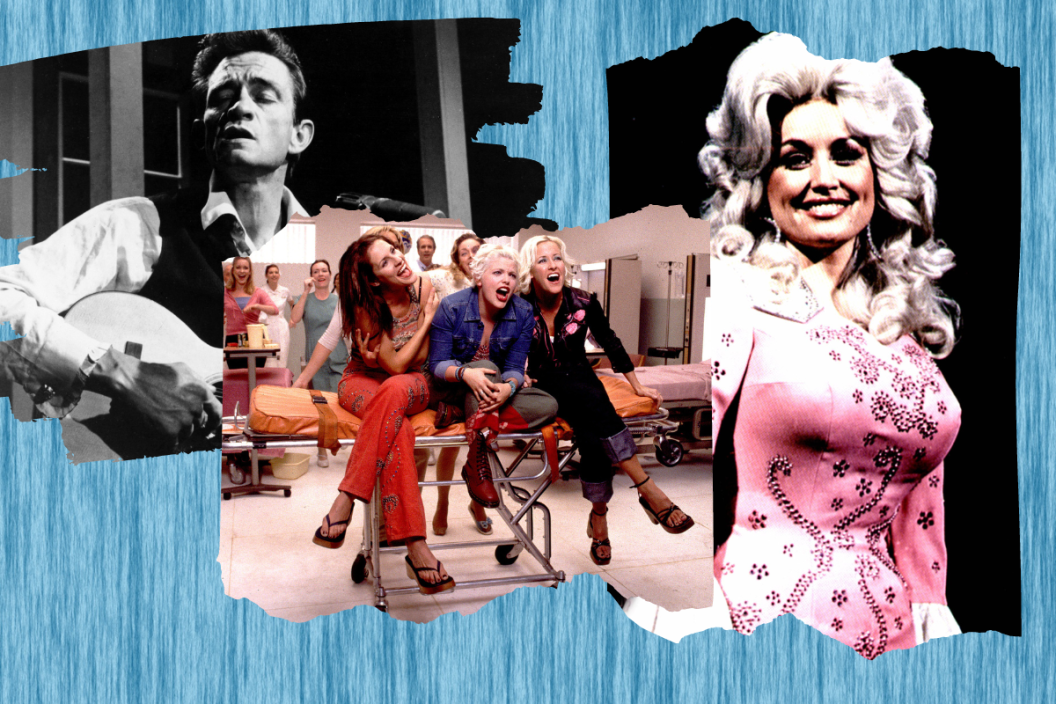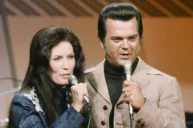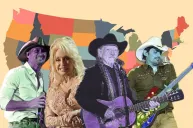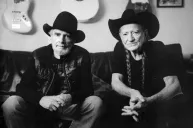The cliche is true— many of the greatest country songs tell rich and relatable stories. Most any fan of the genre can attest to this, whether their tastes lean traditional or pop.
Story-songs predate country music. The genre's earliest radio stars and recording artists tweaked such existing folk traditions as murder ballads and disaster songs to suit their audiences. Country's greatest stars of the '60s modernized this formula, with Johnny Cash and Dolly Parton in particular making story-songs cool to a broader audience. Since then, numerous hits kept story-songs relevant, from Garth Brooks' "The Thunder Rolls" to Carrie Underwood's "Two Black Cadillacs." In more recent times, elite songwriters and song interpreters have kept storytelling at the heart of an ever-evolving genre — and there's no reason to think that'll change as we get deeper into the streaming age.
Across this 100-year timeline, characters living everywhere from the Old West to the modern suburbs have wrestled with the human condition in songs that tackle everything from romantic betrayal to spiritual redemption.
For more historic context, check out our chronological list of the 18 best country songs of all time that tell a coherent and compelling story.
"Philadelphia Lawyer," Maddox Brothers and Rose (1949)
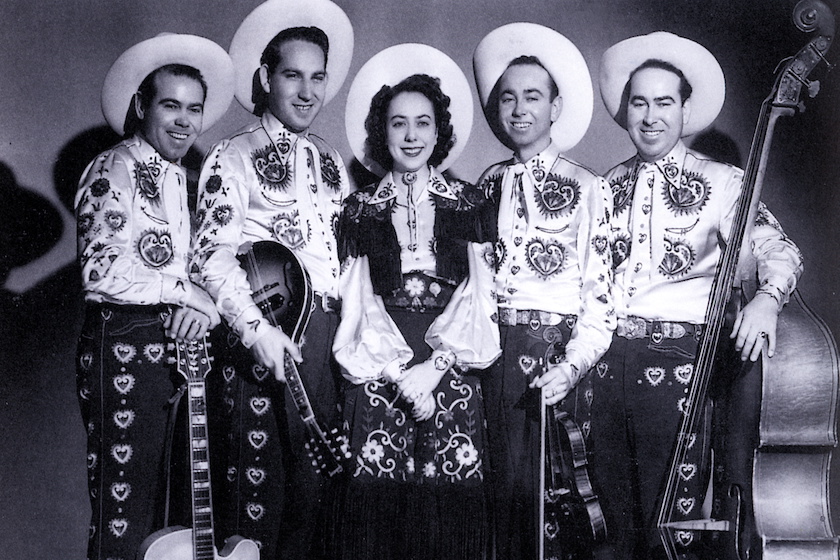
GAB Archive/Redferns
Early country and rock influencers Maddox Brothers and Rose pushed the murder ballad tradition that predates recorded popular music into the future with this recording of a Woody Guthrie standard. Note that the murder ballad and fractured love story combo has persisted throughout country music history, from Lefty Frizzell's "Long Black Veil" in 1959 to Lainey Wilson and Hardy's "Wait in the Truck" in 2022. Listen to "Philadelphia Lawyer" here.
"El Paso," Marty Robbins (Gunfighter Ballads and Trail Songs, 1959)
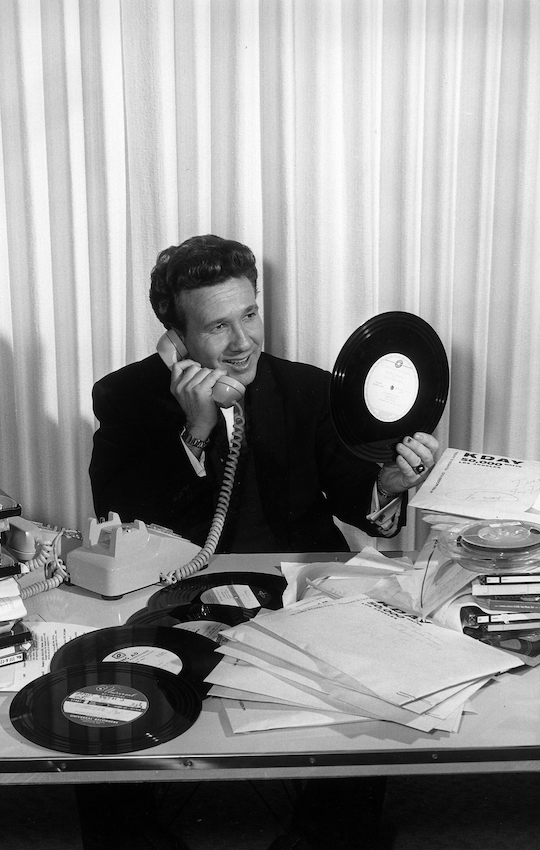
Warner Bros/Michael Ochs Archives/Getty Images
This epic story of a gun-slinging cowboy became a No. 1 country and pop hit— an unlikely feat at a time when four-plus minute songs from any genre weren't considered radio or jukebox friendly. Over 60 years later, "El Paso" remains the quintessential country story-song that's tied to a specific place. It's a trend that's continued with Blake Shelton's "Austin" and other honorable mention picks. Listen to Robbins here.
"Ode to Billie Joe," Bobbie Gentry (Ode to Billie Joe, 1967)
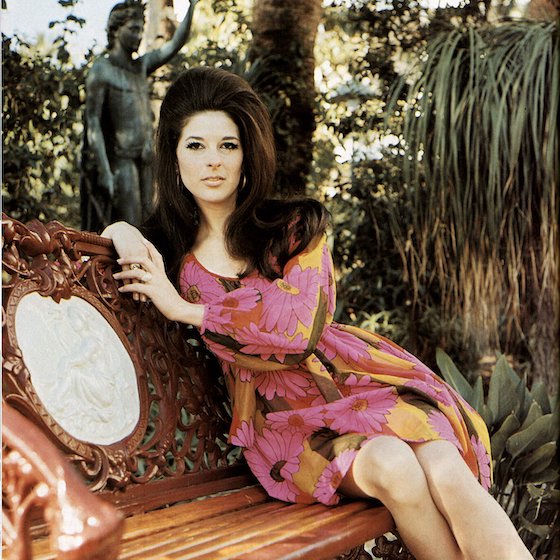
GAB Archive/Redferns
Gentry's debut single famously knocked the Beatles' "All You Need is Love" off top of the all-genre Billboard Hot 100. Beyond being a gorgeous blend of orchestral country instrumentation and Gentry's rich vocals, it's an arresting story with still-unanswered questions about its deeper meaning. Listen here.
"A Boy Named Sue," Johnny Cash (At San Quentin, 1969)
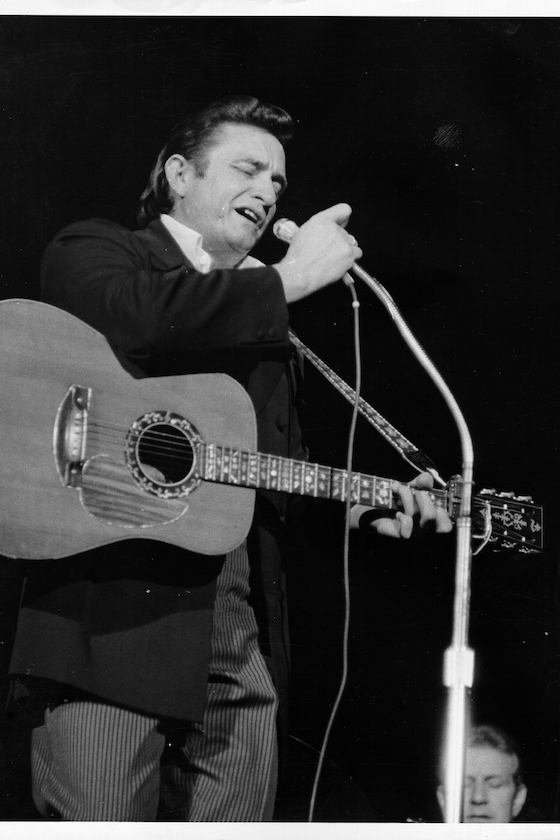
Michael Ochs Archives/Getty Images
Songwriter and children's author Shel Silverstein penned this humorous yet poignant tale that's a better-known example of Cash's silly side than the entirety of 1966 novelty album Everybody Loves a Nut. Silverstein wrote numerous story-songs of note, many of which were cut by Bobby Bare. In the grand scheme of Cash's career, it represents one of many sides of a versatile storyteller who could make you laugh, cry or pray. Listen here.
"Ruby, Don't Take Your Love to Town," Kenny Rogers & the First Edition (Ruby, Don't Take Your Love to Town, 1969)
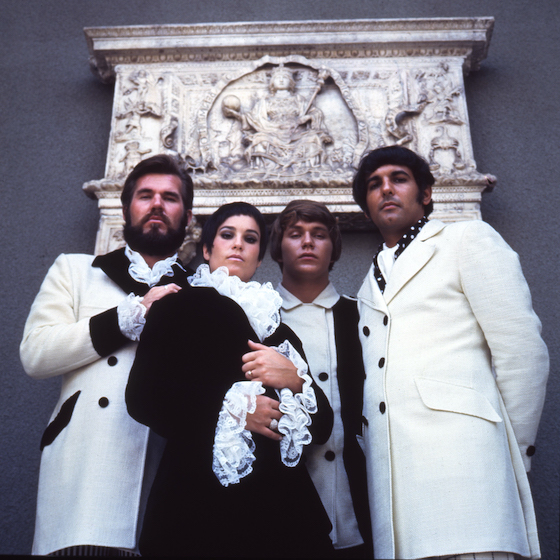
Michael Ochs Archives/Getty Images
Rogers was an ace storyteller, as heard on "The Gambler," "Lucille" and "The Coward of the County." Before his run as a solo country sensation, Rogers and country-rock band the First Edition brought to life this Mel Tillis-penned tale of a person with disabilities and Vietnam veteran who's begging for grace from a cheating wife. Listen here.
"The Carroll County Accident," Porter Wagoner (The Carroll County Accident, 1969)
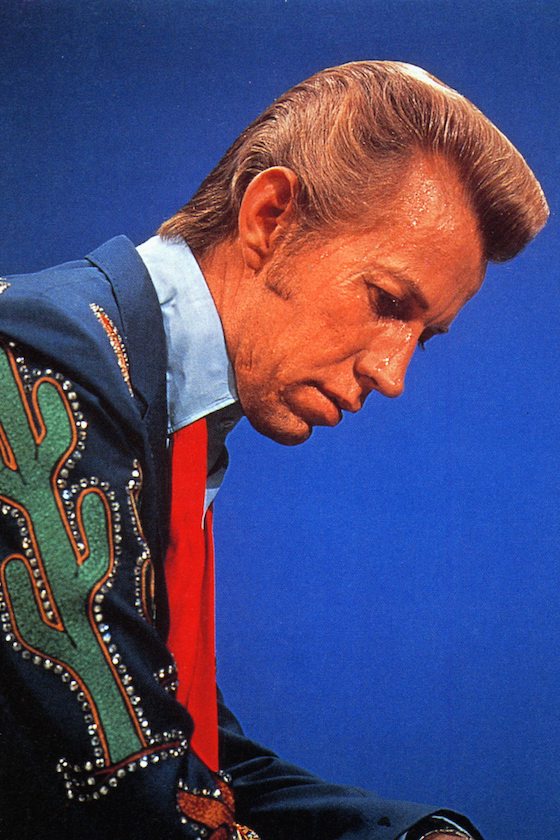
GAB Archive/Redferns
Wagoner's main contribution to story-songs tells of a single-car accident in which two reputable peoples' cheating ways get exposed to their neighbors and spouses. It's part disaster song in line with formative folk tune "Wreck of the Old 97," part old fashioned cheating song. It won the CMA Song of the Year trophy in 1969. Listen here.
"The Year That Clayton Delaney Died," Tom T. Hall (In Search of a Song, 1971)
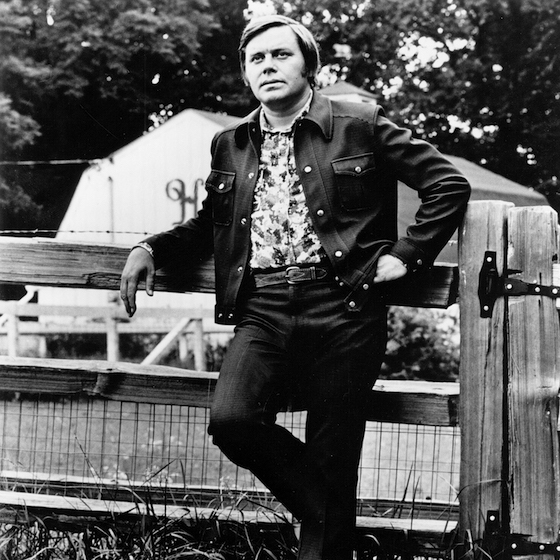
Michael Ochs Archives/Getty Images
Before Dennis Linde, Brandy Clark and Ashley McBryde, Hall set the bar high for story-songs that create more than vivid characters— they paint a portrait of an entire small town. "The Year That Clayton Delaney Died" is one of several Hall songs that back this up, with "The Little Old Lady Preacher" being another. In each case, it's easy to picture the world in which his characters live and interact with each other. Listen here.
"Coat of Many Colors," Dolly Parton (Coat of Many Colors, 1971)
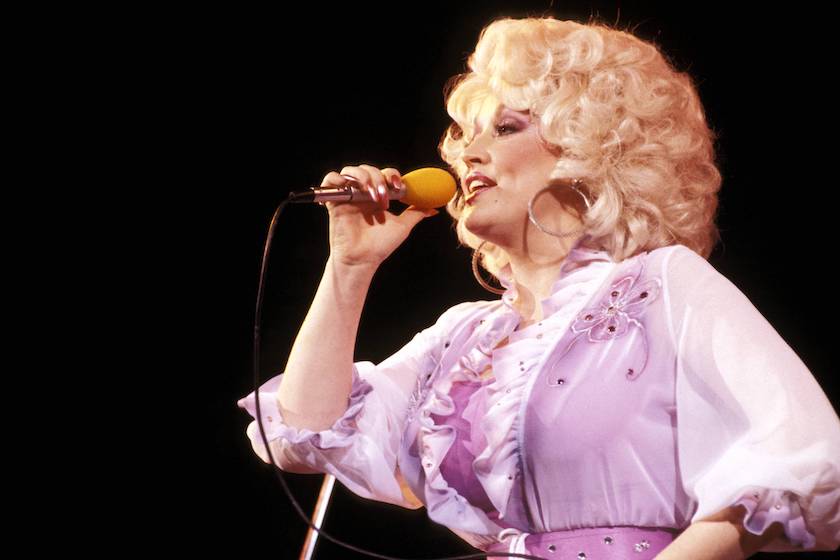
Richard E. Aaron/Redferns
Just like her peer Loretta Lynn, Parton inserted real-life experiences into story-songs that connected on a personal level with everyday folks. The autobiographical element in early Parton songs often pointed back to her humble upbringing in East Tennessee. Take for instance "Coat of Many Colors," which spoke to anyone who'd ever been ridiculed for wearing hand-me-downs to school. Listen here.
"Uneasy Rider," Charlie Daniels (Honey in the Rock, 1973)
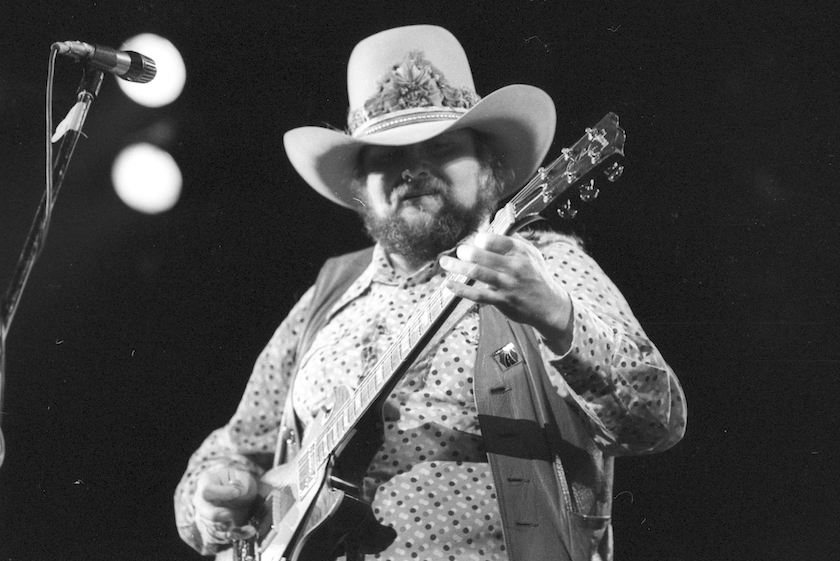
Michael Ochs Archives/Getty Images
Before Hank Williams Jr. found his own voice through similar tales, Daniels poked good-natured fun at the tension between rednecks and outsiders. In this case, Daniels gives a sympathetic take on a hippie who's stepped into the wrong rural Mississippi bar. More famously, musical morality play "Devil Went Down to Georgia" paints as vivid a picture as any contemporary story-song. Listen to "Uneasy Rider" here.
"Golden Ring," George Jones and Tammy Wynette (Golden Ring, 1976)
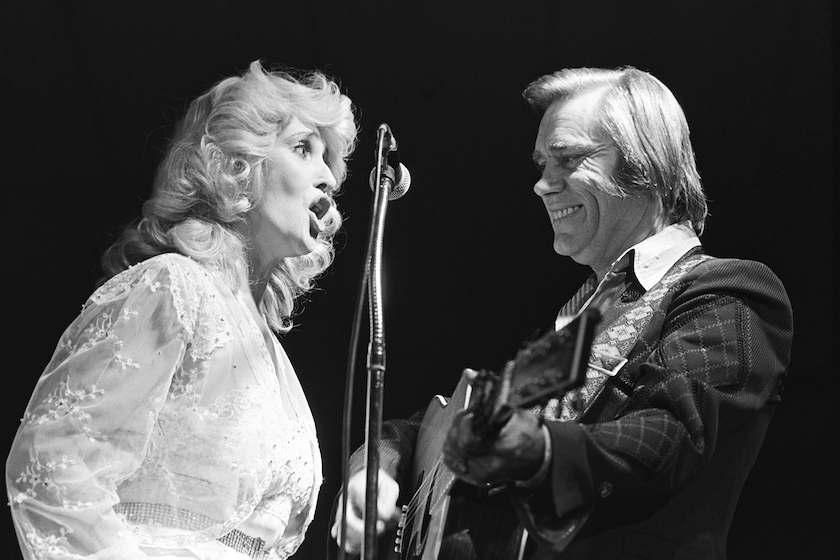
Brian Rasic/Getty Images
A No. 1 hit and all-time great country duet, "Golden Ring" follows a cheap engagement band from being a priceless symbol of a marriage to the meaningless relic of a divorce. Notably, Jones and Wynette were freshly divorced at the time of the single's release. It's the type of fractured love song that few ever sang better than Jones ("He Stopped Loving Her Today") or Wynette ("I Don't Wanna Play House"). Listen here.
"Pancho and Lefty," Willie Nelson and Merle Haggard (Pancho and Lefty, 1983)
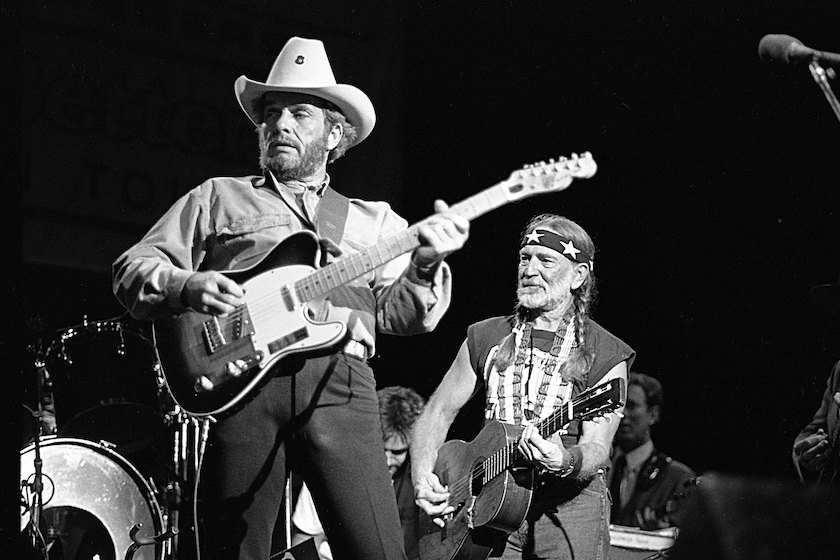
Beth Gwinn/Getty Images
Townes Van Zandt's "Pancho and Lefty" is the country song equivalent of a visually arresting and alluringly mysterious art house film. Van Zandt's cinematic tale got immortalized by a string of Country Music Hall of Famers: first Emmylou Harris and then the dream team of Nelson and Haggard. Listen here.
"Desperados Waiting For a Train," The Highwaymen (Highwayman, 1985)
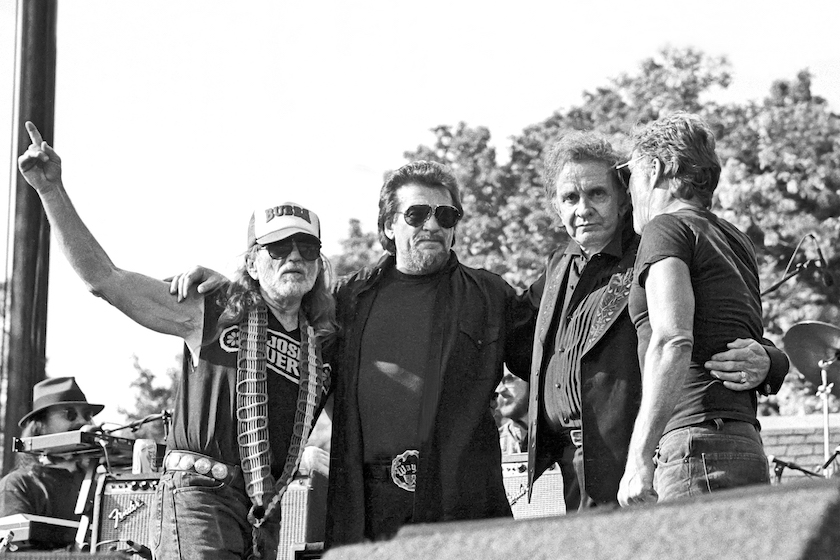
Jack Vartoogian/Getty Images
This Guy Clark original doesn't just encapsulate the love many children share with a grandparent. The working-person's poet paints a very vivid picture of a man inspired by Clark's grandmother's boyfriend. It was first recorded by Jerry Jeff Walker for his 1973 live album Viva Terlingua and introduced to a global audience by country supergroup the Highwaymen. Listen here.
"Love Without End, Amen," George Strait (Livin' It Up, 1990)
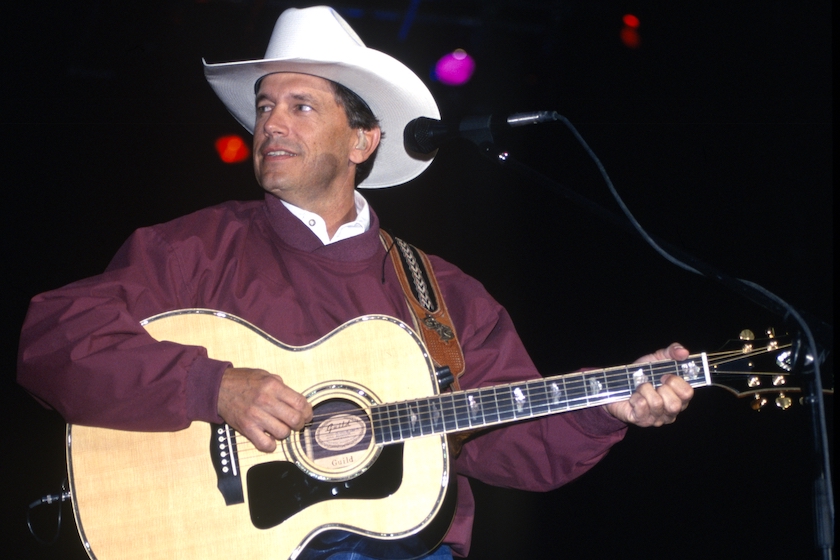
Tim Mosenfelder/Getty Images
Strait's first great single of the '90s tells a secret about fatherly love in the secular and spiritual senses. The uplifting three-part act set the mold for such subsequent time-lapsed story-songs as Tim McGraw's "Don't Take the Girl" and Scotty McCreery's "Five More Minutes." It also proved the commercial viability of gospel-flavored songs: a notion backed up in 1993 by Alabama's "Angels Among Us." Listen to "Love Without End, Amen" here.
"Goodbye Earl," The Chicks (Fly, 2000)
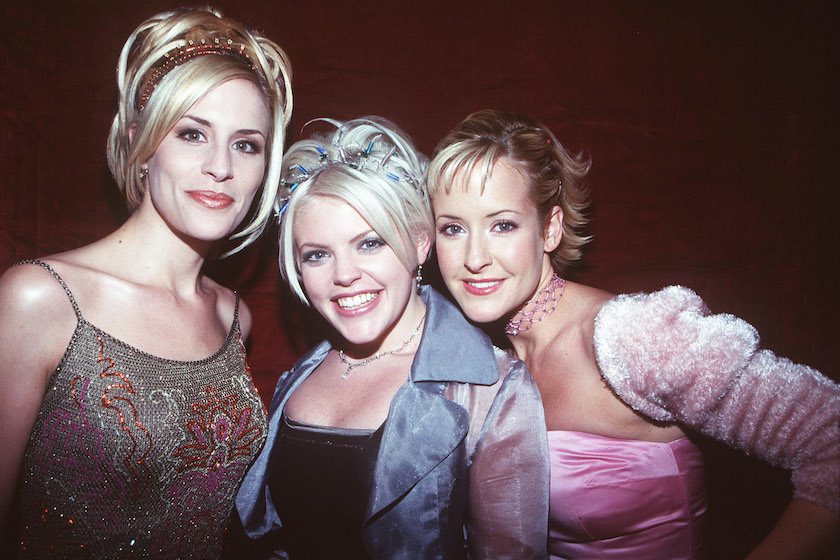
Ron Wolfson / Contributor
While "Philadelphia Lawyer" and other iconic murder ballads bring an understandably somber tone, there's a disconnect between the peppy tone of "Goodbye Earl" and its themes of domestic abuse and vigilante justice. The catchiest chorus in the story-song timeline brings a greater sense of moral ambiguity to a topic already covered as candidly by Martina McBride's "Independence Day." Listen to The Chicks here.
"The Little Girl," John Michael Montgomery Feat. Alison Krauss and Dan Tyminski (Brand New Me, 2000)
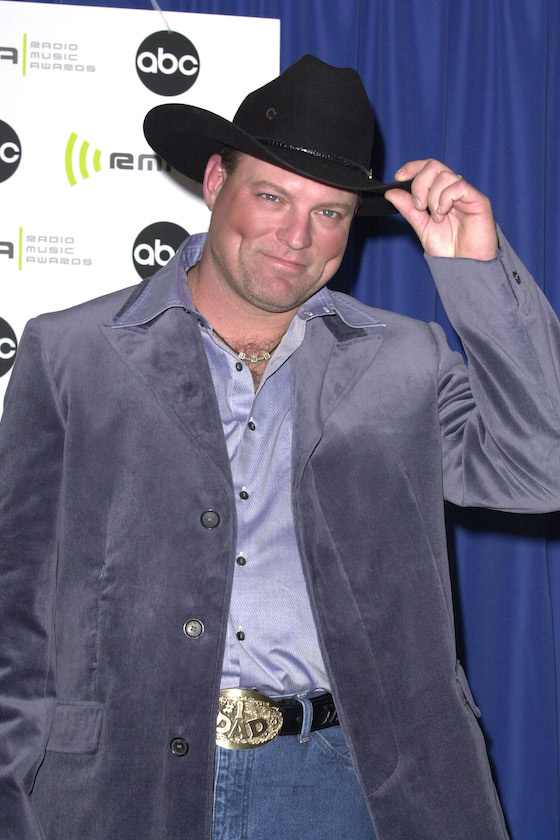
SGranitz/WireImage
Few country songs throughout the genre's 100-year history pack as much emotion into less than four minutes as this No. 1 shared by Montgomery and two members of Alison Krauss and Union Station. It's a roller coaster of abuse and survival with a faith-driven final message. Martina McBride covered similar ground two years later with "Concrete Angel." Listen to "The Little Girl" here.
"Three Wooden Crosses," Randy Travis (Rise and Shine, 2002)
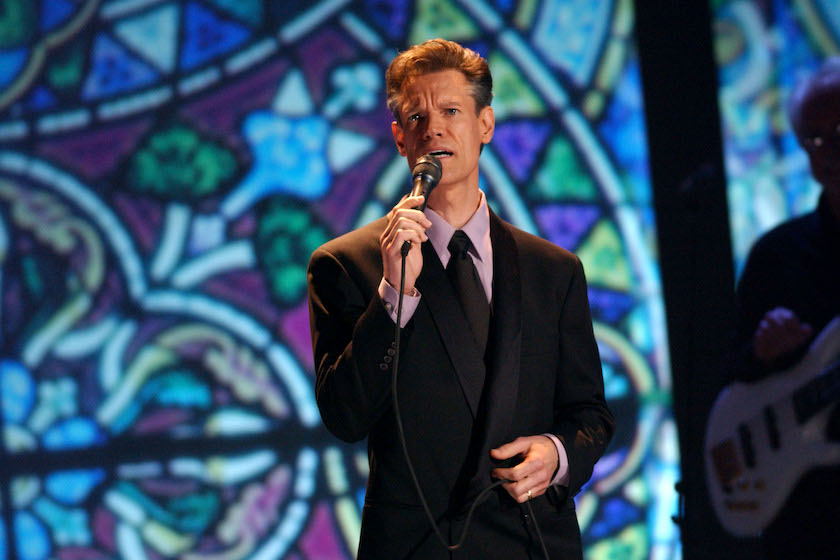
R. Diamond/WireImage for Gospel Music Association
On his best-known gospel song, Travis tells a story of faith, love, redemption and mortality. It's from the perspective of a minster, whose sermon ends with the surprise twist that makes the song so memorable. Though it goes to dark places, it ends with a greater since of hope than what's typically offered in a classic country murder ballad or heartbreak song. Listen here.
"Whiskey Lullaby," Brad Paisley and Alison Krauss (Mud on the Tires, 2003)
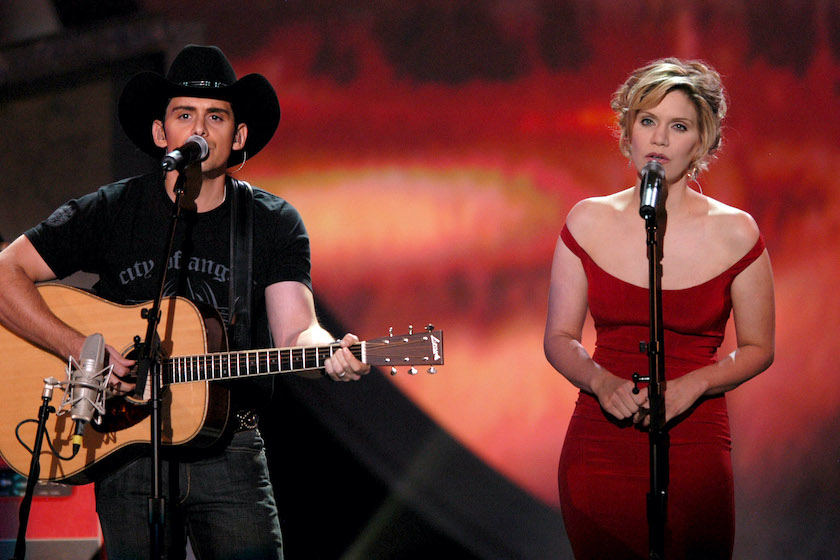
Ron Wolfson/WireImage for Bragman Nyman Cafarelli
The 21st century high water mark for story-songs got set nearly 20 years ago by the duo of Paisley and Krauss. Though the couple in the Jon Randall and Bill Anderson co-write go their own ways, they ultimately meet the same fate. The 2005 CMA Song of the Year award winner peaked at No. 3 on the Billboard Hot Country Songs chart, making it one of the most revered singles to never reach No. 1. Listen here.
"The House That Built Me," Miranda Lambert (Revolution, 2009)
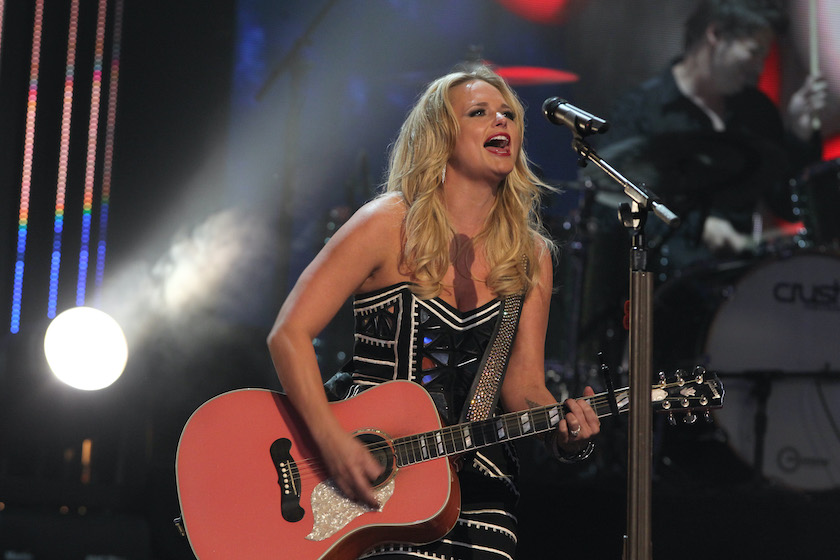
Robert Gauthier/Los Angeles Times
The newest song on our list tells the most timeless story of them all. Co-writers Tom Douglas and Allen Shamblin wax nostalgically without getting too syrupy while capturing the feelings many associate with their childhood home. Lambert delivered it impeccably, as did Tanya Tucker on her 2019 comeback album Bring My Flowers Now. Listen to Lambert's version here.
